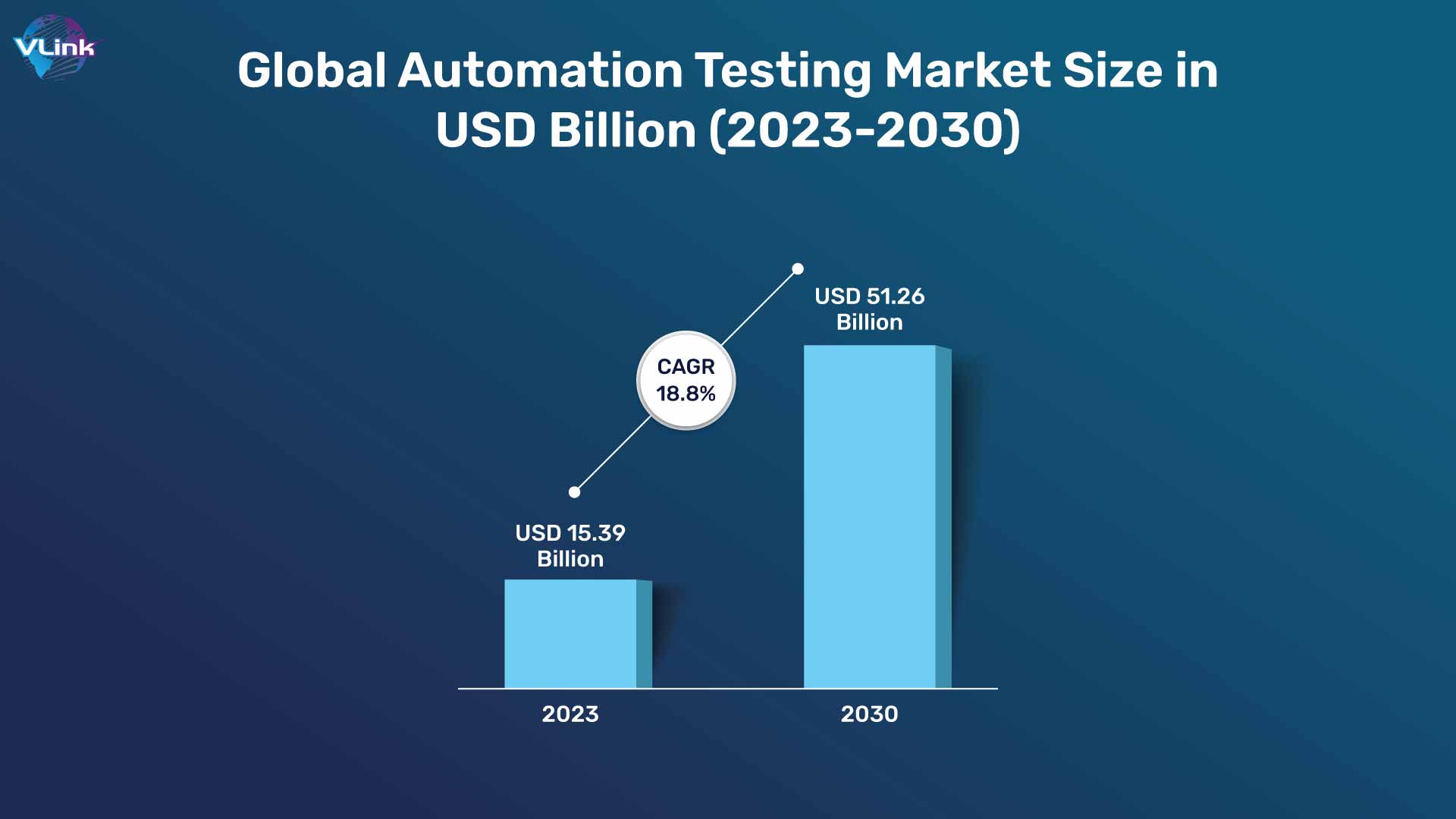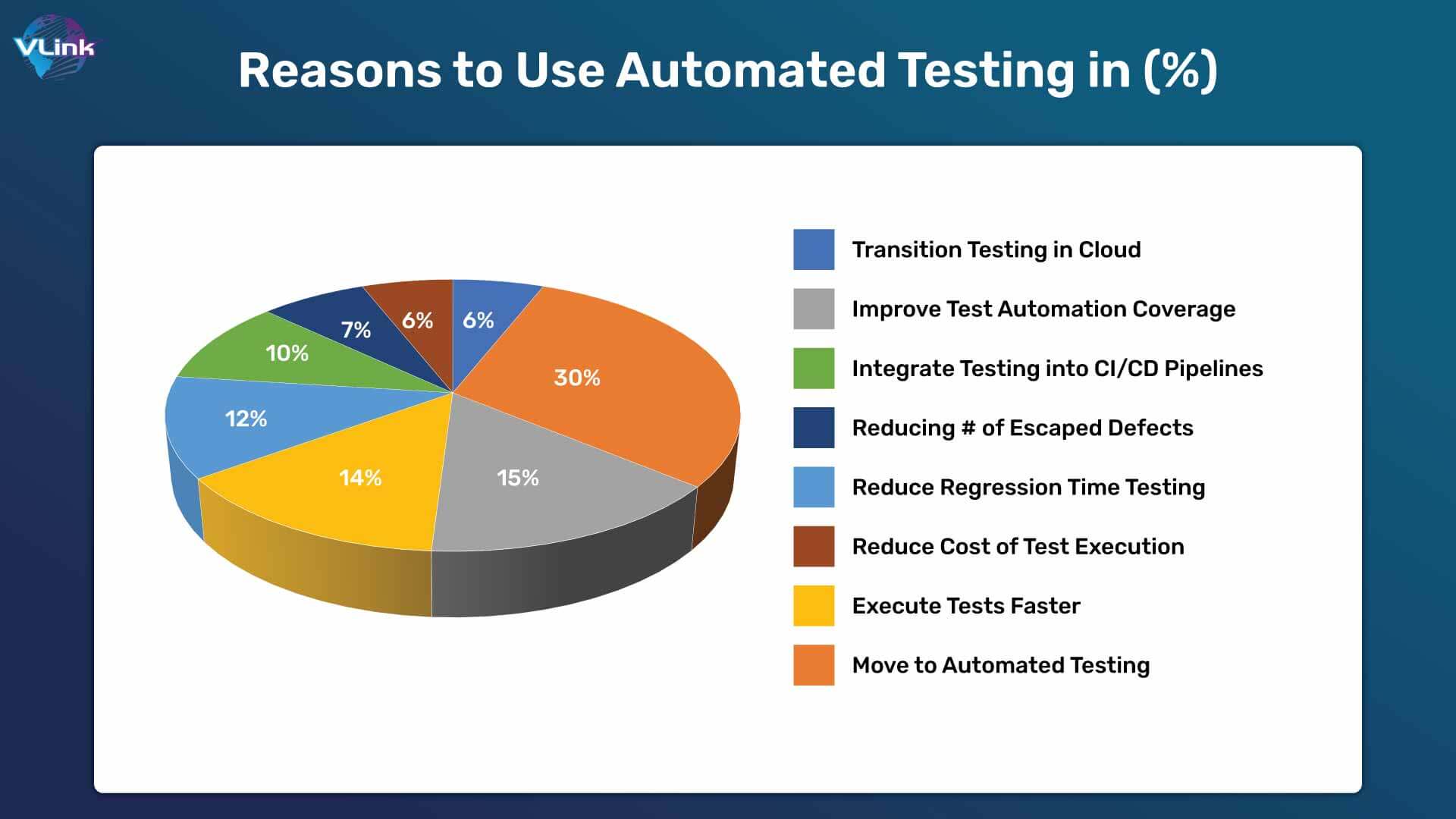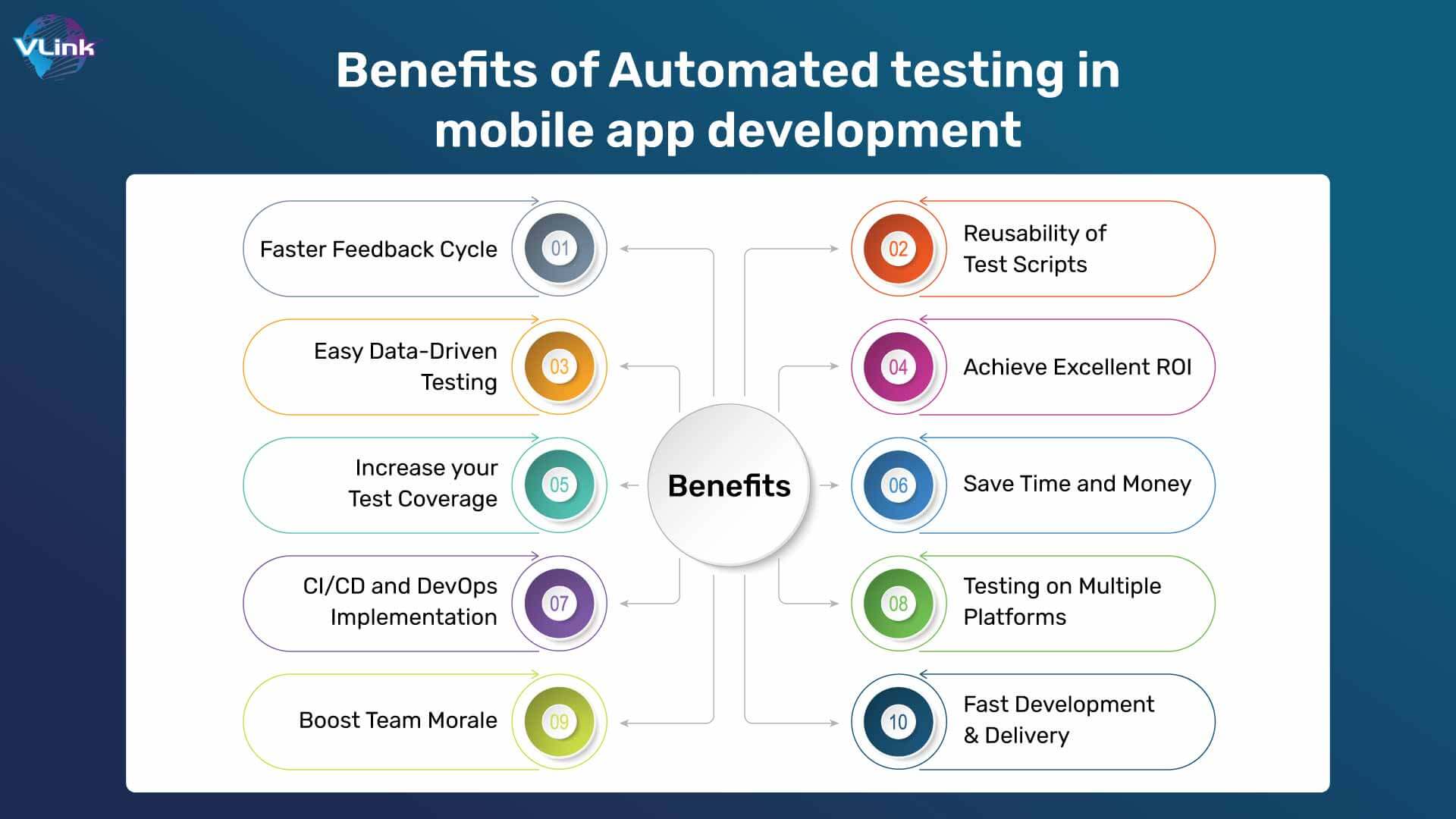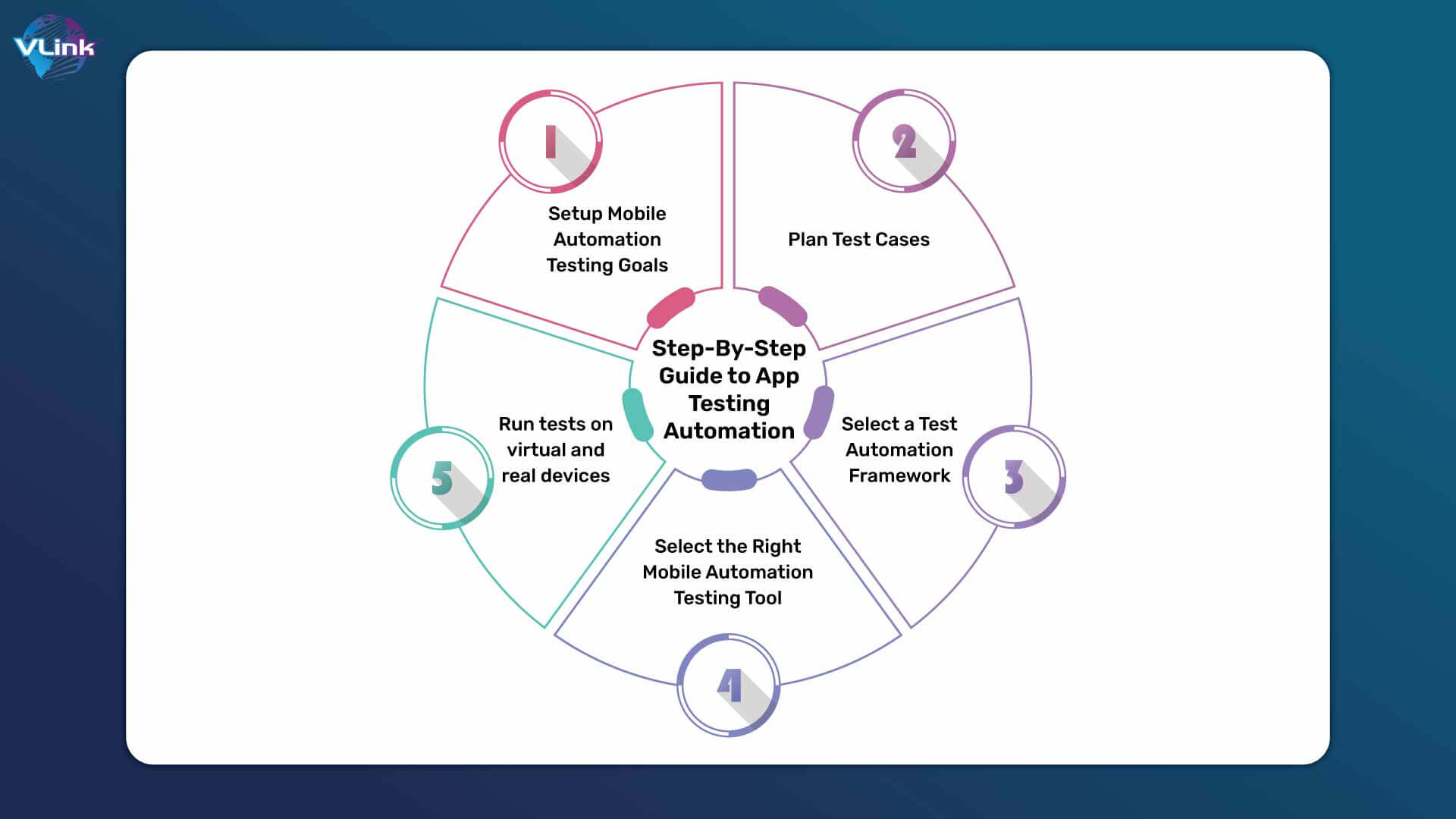Mobile apps often fail because of problems like slow loading speed, security loopholes, poor performance, broken links & poor app navigation. That's where mobile app testing comes in!
Testing mobile apps is integral to software development, ensuring alignment with user requirements, bug-free functionality, and a seamless user experience. Manual mobile app testing can be both time-consuming and costly.
Many businesses should leverage automated mobile app testing to get scalable, robust, and fully functional mobile apps. Automated mobile app testing has become increasingly popular due to its benefits.
The global automation testing market size is projected to grow from USD15.39 billion in 2023 to USD 51.26 billion by 2030, at a CAGR of 18.8%.

This blog post will discuss the benefits of automated mobile app testing. Let's start with the basics of automation and the difference between manual and automation testing.
What is Automation Testing in Mobile App Development?
Automation testing in mobile app development involves automated scripts and tools to execute predefined test cases on mobile applications. It aims to ensure the app's functionality, performance, and security by automating repetitive testing tasks.
Software QA testing services for enterprises accelerates testing processes, enhances accuracy, and helps identify issues early in the development cycle. It contributes to faster and more reliable mobile app releases.
How does Automation Testing Work?

Implementing Test Automation in organizations involves adopting a framework with established standards, common practices, and testing tools. A robust Automated Testing Framework encompasses coding standards, methods for managing test data, object repositories, procedures for storing test results, and guidelines for utilizing external resources.
Tests are run and documented based on the chosen framework.
For example:
- The linear scripting framework is suitable for smaller applications as it requires minimal planning for test scripts.
- In modular testing frameworks, testers generate small and independent scripts to minimize redundancy, although the initial setup process can be time-consuming.
- Data-driven frameworks enable testers to craft scripts that function across diverse data sets, providing comprehensive coverage with fewer tests.
- Keyword-driven testing frameworks empower testers lacking extensive programming expertise to develop test scripts using predefined keywords. Typically, this involves utilizing table formats to specify keywords for each function and execution method.
- Hybrid-driven frameworks typically integrate two or more approaches to leverage the advantages of each.
Manual Testing Vs. Automation Testing: What's the Difference?
Criteria | Automation Testing | Manual Testing |
Speed | Faster than manual testing | Requires human resources |
Investment | Higher | Lower |
Reliability | More Reliable | Not accurate, possibility of human error |
Cost-effective | Yes | No as ROI is lower |
Performance Testing | Easy testing | It’s difficult to do manually. |
Set up | Less complex test execution set up | Have a straightforward test execution setup. |
Deadlines | No Chance of missing deadlines | Higher chances of missing out deadlines. |
Framework | Data Driven, Keyword, and Hybrid to increase the speed of automation process | Doesn’t have frameworks but may use guidelines, checklists, and strict processes. |
When to Use? | Ideal for Regression Testing, Load Testing, Performance Testing, repeatable functional test | Suitable for Usability, Exploratory, and Adhoc Testing. |
Benefits of Automated Testing in Mobile App Development

Here are benefits and roles of automated testing for software product development:
Faster Feedback Cycle
Test automation enables organizations to shorten the feedback cycle for new software features, leading to quicker input from testers to the development team. Accelerated communication allows the development team to promptly address code issues, reducing the risk of releasing buggy software.
Early bug detection in the development stage, facilitated by test automation, further expedites the software development process by enabling timely bug corrections.
Reusability of Test Scripts
Creating test cases demands significant time and effort, making the reusability of test scripts a crucial benefit in automated testing. Testers must develop separate test scripts when conducting cross-browser tests for new operating systems or devices. The reusability of automated test scripts allows testers to manage their time efficiently during testing.
A notable advantage of combining Appium and HeadSpin in the automation of testing procedures is the ability to record testers' actions and convert them into code snippets for script integration. This functionality reduces the need for extensive manual coding, streamlining the testing process.
Easy Data-Driven Testing
Test automation offers a crucial advantage in data-driven testing, allowing testers to assess various functionalities across multiple data sets. This approach contributes to the acceleration of the application delivery pipeline, with several notable benefits, including:
- Facilitates the reuse of functions and actions within testing processes.
- Centralizes verification and test data storage in a singular file, segregating them from test case logic.
- Reduces the overall number of test scripts and cases.
- Maintains all test scripts in a unified repository.
The HeadSpin Platform prominently features data-driven analysis, empowering enterprises to gather over 120 data points to evaluate their applications' performance and user experience comprehensively.
Achieve Excellent ROI
Relying solely on manual testing extends the time required for software development teams to create and release applications. Additionally, the repetition of manual quality tests can lead to delays in software or feature releases, impacting the return on investment for organizations.
The integration of automated testing proves beneficial in expediting product release timelines by automating repetitive operations, thereby minimizing resource requirements and ultimately yielding a more favorable return on investment.
Increase your Test Coverage
Attaining 100% test coverage for complex applications poses a significant challenge for testers, especially in manual testing, where managing numerous test cases is arduous.
A viable solution to this challenge lies in the automation of testing processes. Automation tools prove invaluable in aiding testers by extending test coverage and facilitating the examination of features such as UI, databases, and servers. These tools empower testers to enhance application quality without compromising functionality.
In addition, achieving full test coverage allows testing teams to analyze past and present releases, systematically monitoring each build cycle and project fixes.
Save Time and Money
Automated mobile app testing offers substantial time and cost efficiency advantages. By swiftly and precisely executing tests, automation diminishes the duration traditionally spent on manual testing. This substantial time reduction contributes to a quicker time to market for the app, enabling developers to release it more expeditiously and at a reduced cost.
In addition, the capability of automated testing to operate continuously, 24/7, ensures testing can persist beyond regular business hours, resulting in time savings and heightened productivity.
CI/CD and DevOps Implementation
The integration of test automation is imperative for successfully implementing Continuous Delivery and DevOps methodologies. Automated testing becomes crucial in navigating the CI/CD pipeline, where each developer's code contribution must undergo testing. Adopting automated testing practices significantly facilitates the transition to Continuous Testing and Delivery.
Effectively coordinating test automation across the CI/CD pipeline can be challenging, given the complexities and volume of test cases, making management a potential hurdle.
Fortunately, incorporating AI-powered solutions offers a strategic approach to streamline bright testing orchestration. These solutions prove instrumental in overcoming test automation bottlenecks, enhancing the overall value derived from automated testing processes.
Testing on Multiple Platforms
Ensuring cross-browser compatibility is crucial to verify during the software development lifecycle. The manual testing of software across the multitude of available browsers is an uphill task due to its sheer number.
Test automation tools offer a solution by enabling testers to generate numerous test cases for efficient cross-browser testing. Consequently, the testing team can rapidly and simultaneously conduct comprehensive cross-browser testing across various browsers, operating systems, and devices for a software application.
Boost Team Morale
In addition to delivering tangible advantages, test automation uplifts team morale. According to the McKinsey Global Institute, it has the potential to automate approximately one-third of activities in 60% of occupations. By handling routine and repetitive tasks, test automation liberates individuals to engage their intellect in more fulfilling and challenging responsibilities.
Consequently, teams become more productive and innovative, consistently delivering high-quality results. In addition, automation only allows quality assurance teams to carry out manual tests effectively, including usability, exploratory, and ad-hoc tests, which are unsuitable for automation.
Fast Development & Delivery
Time savings are a notable advantage of automation testing. These tests are swiftly executed and can be repeated efficiently, eliminating the need for weeks to rerun them—merely a matter of hours. It leads to:
- Abbreviated software development cycles
- Consistent and frequent software releases
- Rapid application updates and modifications
- Expedited time-to-market for products.
Step-By-Step Guide to App Testing Automation
Steps of mobile application app testing automation below in the image:

What is the Future of Automated Testing in App Development?
The future of automated testing in app development is poised for advancements.
Anticipated trends include:
- Increased adoption of AI and machine learning for more innovative testing.
- Greater integration with DevOps for seamless continuous testing.
- Enhanced support for mobile and IoT devices.
- The rise of codeless test automation solutions for improved efficiency.
As technology evolves, automated testing will play a pivotal role in ensuring applications' quality and rapid delivery in the dynamic landscape of app development.
Connect VLink for Automated Software Testing Services!
VLink is an IT outsourcing and application development company with a team of 250+ experienced software developers, data scientists, designers, IT engineers, and technical writers. We also have an in-house team of 20+ software testing experts.
We can assist with automated testing during mobile app development solutions by offering a group of skilled software testers knowledgeable in automated testing methodologies and tools.
Our dedicated development team can assist in determining the appropriate automation testing framework and tools fit for the application and designing and implementing automated test cases to guarantee the quality of the application.
Different types of testing we can perform are:
- Functional testing
- Performance testing
- Security testing
- Regression testing
Want to know more about automated app development testing? Contact us!
Frequently Asked Questions
Different types of software testing services include:
- Manual Testing: Human-driven testing without automation.
- Automated Testing: The use of tools and scripts to automate testing processes.
- Performance Testing: Evaluating system responsiveness and scalability.
- Security Testing: Identifying vulnerabilities and ensuring data protection.
- Compatibility Testing: Verifying software performance across various platforms.
- User Acceptance Testing (UAT): Assessing software from an end-user perspective.
Popular tools for mobile test automation include Appium, Selenium, XCUITest, Espresso, UI Automator, and TestComplete. These tools support cross-platform testing and enable efficient mobile application testing automation on Android and iOS platforms.
In an automation testing life cycle, stages include planning, test script development, test environment setup, test execution, defect logging, and test results analysis. Continuous improvement and maintenance are ongoing aspects that ensure the effectiveness and efficiency of automated testing processes.








